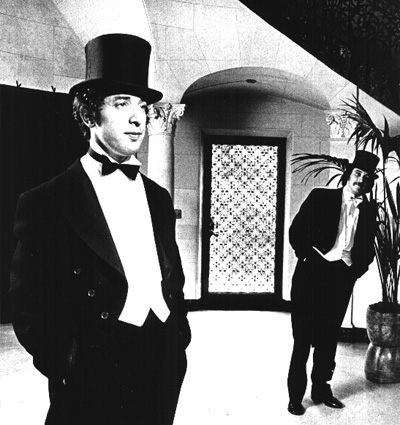Ever so rarely, we find an album that comes along and gathers dust on music store shelves, until a few years later, when critical opinion catches up with the art. This story is about four such great albums that didn’t get their dues. It’s about four great albums that had a sense of identity, a great sound, a unique feel, a personal style, yet didn’t quite cut it. What follows is, at best, a personal appreciation of these albums. At worst, it’s an exercise in cultivated irrelevance. So.
Grand Hotel: Where Fortunes Speed and Dissipate
Better Known For: their début Procol Harum; the hit single A Whiter Shade of Pale; and their third album, A Salty Dog.
 Procol
Harum can be unbearably pretentious, it’s true. (I mean, Christ!, they named
their ninth album Procol’s Ninth.) But they can also be wonderfully
poignant and melancholic. Their best-selling single A Whiter Shade of Pale,
and their eponymous début album don’t really work for me, with its hotchpotch of
classical music and blues-inspired pop. But their seventh album, Grand Hotel,
showed a certain unique baroque sensibility that was taking wing.
Procol
Harum can be unbearably pretentious, it’s true. (I mean, Christ!, they named
their ninth album Procol’s Ninth.) But they can also be wonderfully
poignant and melancholic. Their best-selling single A Whiter Shade of Pale,
and their eponymous début album don’t really work for me, with its hotchpotch of
classical music and blues-inspired pop. But their seventh album, Grand Hotel,
showed a certain unique baroque sensibility that was taking wing.The album suffers from all the problems that routinely plague Procol Harum – problems other than Keith Reid’s puerile songwriting, for whom there really can be no excuse – namely a lack of direction in terms of the sound, a lack of vision and extreme self-indulgence.
However, where Procol’s Grand Hotel succeeds, is in finding suitable content for their pop-magnified-into-classical-music form. The title track, with its many segments lending the song an eerie atmosphere of pretence and charade, sets the tone for the album. The second track, Toujours L'Amour is a guitar vamp-driven song that bounces off its considerably more conservative rock sound against the glitzy decadence of the title track. A Rum Tale builds on the previous track’s themes of love and loss, with a greater use of Procol’s trademark Hammond-organ-and-piano sound.
T.V.Caesar is easily the pick of the album. The humorous yet poignant song, revolving around a mouse who acts mute observer of the protagonist’s lonely life, mostly spent in front of the television (when he is not partying at the Grand, one assumes). Most unusually for Keith Reid, the lyrics do not bluntly bludgeon the unsuspecting listener’s head with the idea, using simple yet eloquent direct speech instead. (T.V. Caesar mighty mouse/ Tops the Pops in every house/ Sandwiched in between the ads/Something for the mums and dads/ ‘Great to have you on the show’/ ‘Sorry that you've go to go’/ T.V. Caesar mighty mouse gets the vote in every house)
Souvenir in London [sic] too is a fine song, about some contraband material that the narrator has bought [?] as a souvenir in London. The track makes unusual use of the organ’s vamps to build the song’s narrative, instead of trying to create more pompous gravitas.
The good work on the previous three tracks are [sic] almost undone by Bringing Home the Bacon, which marks a return to the kind of glorious self-indulgence that gives all progressive rock a bad name. Long repetitive guitar bridges make the song rather intolerable, in spite of the competent lyrics. Although the arrangement is rather unremarkable, the song forms a kind of bridge between the opulence that marked the album until this song and the tales of misery and death that follow. With this track, the sang-froid of the grand soirées described in the first half of the album give way to the misery that lurked beneath. And even a song about jilted love – A Rum Tale – begins to assume greater significance.
Chris Copping’s organ rises up to the occasion beautifully with For Liquorice John. The song, about a man who ‘fell from grace’ and died upon his return from an unnamed city [?] , fits in rather neatly with Souvenir from London. At least, enough to make one wonder if the souvenir was dope that he OD-ed on. For when the protagonist of this song died ‘the doctors didn't hesitate / what he had they were not sure’.
Fires (Which Burnt Brightly) builds on the theme of misery that informs the second half of the album and elaborates it to the misery of war. If anyone ever wanted evidence of Procol Harum’s utter lack of self-censure, this is it. A slow, stately bass line and an annoying vocal input from Christianne Legrand don’t improve matters at all. For best results, skip track.
The album ends with a song about a man in great pain who asks for a remedy. The inconclusive end to the album works by removing the events of the last track a long way off from the hedonism of the first half of the album.
Well, why did I pick this album?
It may not have the best writing, best arrangements or even the best performances, but Grand Hotel did have character – a distinct character that makes even the worst of Reid’s gems bearable. I mean real gems like: The cord that they knotted to keep us apart/ Could never be broken: it was tied to my heart/ She grew thin and I grew fat/ She left me and that was that.
And that is saying something!